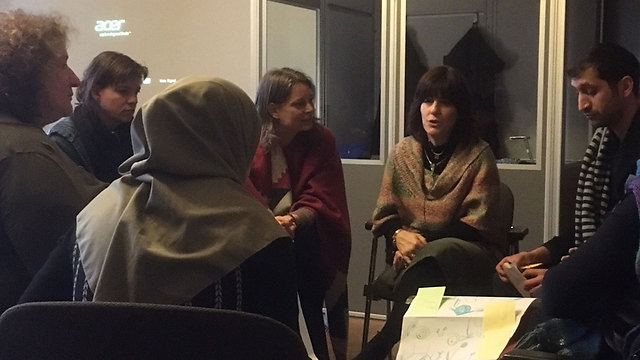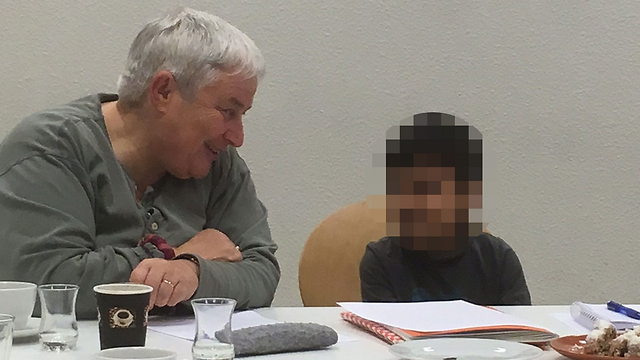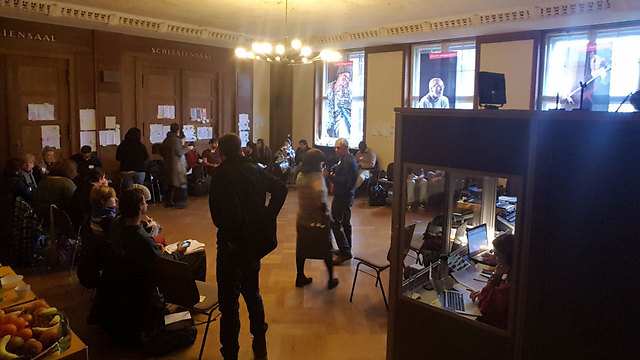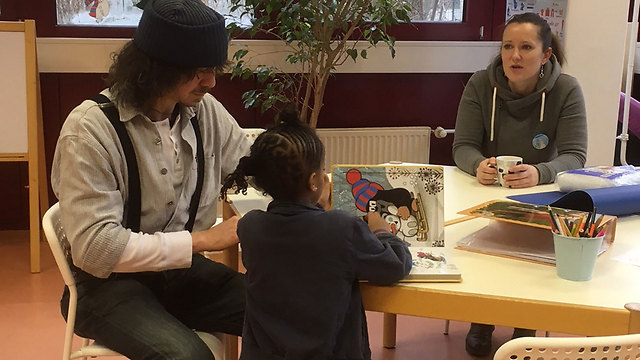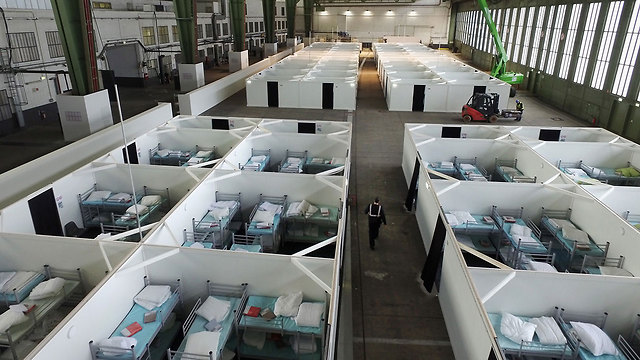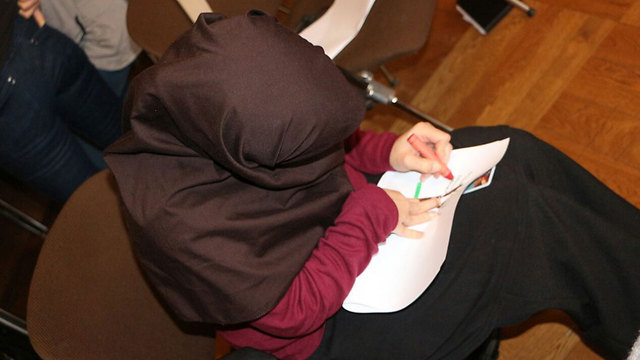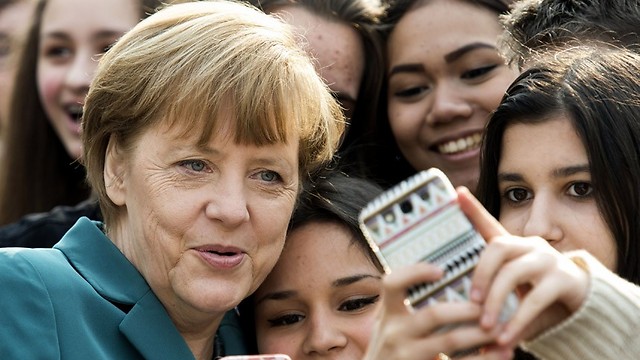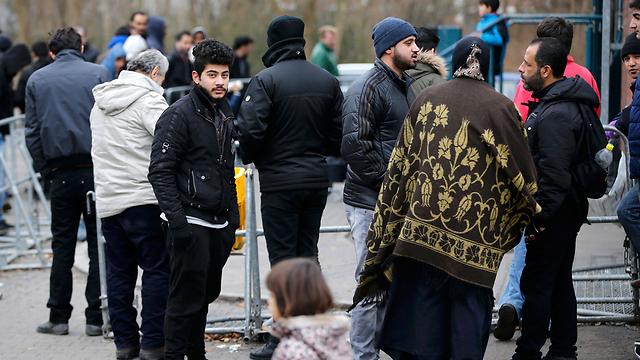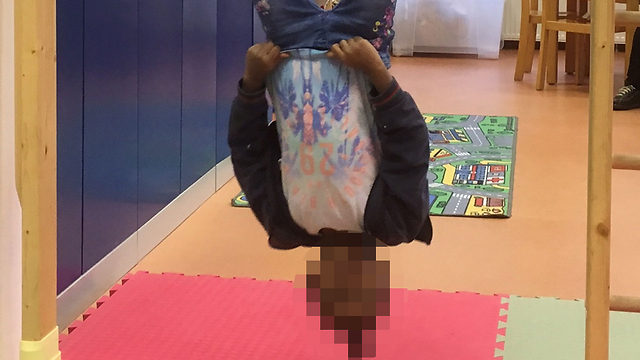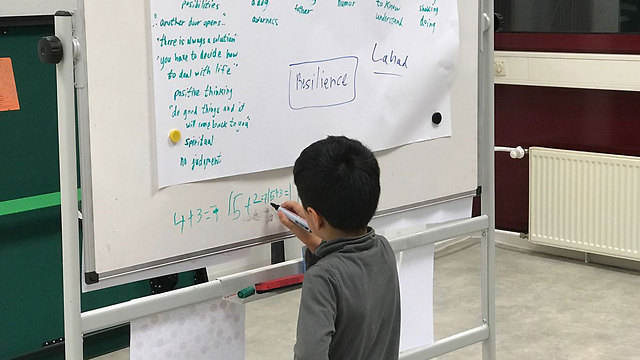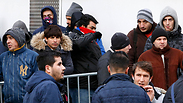
Israelis help German aid workers deal with Syrian refugees
Magazine: After taking the dangerous and arduous journey from the war-torn Syria to Berlin, refugees are surprised to be greeted by professionals from the Israeli Trauma Coalition, who teach German aid workers how to handle the 1.5 million refugees who came into their country.
"The scar is not very heroic," he apologizes with a smile and explains it was barbed wire on the Greece-Macedonia border, or perhaps it was the Macedonia-Serbia border—"I can't remember which border was where anymore"—that gave him this keepsake from the hectic journey he took from his bombed neighborhood on the outskirts of Damascus to the temporary shelter in Berlin.
He got here a year ago. He's 29 years old, but the marks of exhaustion on his face are those of someone who has seen and been through much more than the sum of his years. Only the trendy clothes he wears serve as a reminder that the heart beating in his chest is that of a young man, who has no interest in politics and only wants to live his life.
His name cannot be printed and he must remain anonymous. "The authorities in Syria read everything, including Israeli newspapers, and they will find my family and then they're doomed," he explains.
Eleven years ago he started working for the International Committee of the Red Cross. When the civil war in his country began, he was called to work with the UN's refugee organizations. At the time, the regime issued a decree banning protests, but he and his friends found a way around it.
"Every Friday, we'd go to the mosque and after prayers we'd start rioting and protesting. Hidden among the masses, we could protest with relative safety. That is, until Assad's people started planting undercover agents in the rallies to identify the organizers and arrest them. Police would come and disperse us using tear gas."
'Moved from one border to the next like a package'
A year and a half ago, the noose around his neck began tightening. Members of his family began suffering from harassment by the regime because of his work with the Red Cross, until he and his wife decided to leave Syria. They paid a smuggler who hid them in his car and took them to Beirut. From there, the couple continued to Istanbul, and several days later they began their journey to Greece. They left Turkey from Izmir on a small boat with 40 other refugees."It was so small we weren't even allowed to sneeze because any small movement could have flipped the boat over and cause it to drown," he says.
A 12-hour voyage brought them to the Greek island of Samos, where they met other refugees. A day later, they boarded a ship to Athens and from there began the arduous land journey towards the promised land—Germany.
"We took a bus to the Macedonia border, from there a train to Serbia, and from there a bus to Croatia," he strains to remember, "and then a train to the Croatia-Slovenia border and there they got us off the train and got us on a bus to Austria.
"You can't stop on the way. You move from one border to the next, like a package that no one wants to sign for. At every border, soldiers from the country we arrived to were waiting for us, to frisk us, check our belongings and divide us into groups based on where we came from. We weren't allowed to go alone or split up."
In January 2016, the couple arrived in Munich, where they were placed in a large refugee center, and several weeks later they were transferred to Berlin. Here, they were greeted by aid workers with blankets, food, and a place to stay. Soon they will leave their small room at the refugee center and get an apartment of their own in the German capital.
Until then, they are aided by Israelis from the Israel Trauma Coalition, an umbrella organization led by Talia Levanon that brings together 40 Israeli aid groups that deal with strengthening community resilience, emergency preparedness and mental and social care.
Experienced with treating trauma
The Israeli Trauma Coalition (ITC) was established in 2001, in the midst of the second intifada, to help Israelis deal with post-traumatic disorder, particularly victims of terror attacks. The ITC also offered assistance to professionals like firefighters, doctors, school teachers and kindergarten teachers in the southern region, which is under the perennial threat of rockets.In May, Germany's embassy in Israel introduced the ITC to a local German aid group that runs three refugee centers in Berlin. André Losin, who works with the local aid group, jumped at the opportunity to work with the ITC.
"Israelis have a lot of knowledge on this subject," he says. "And they're very advanced in their treatment of trauma victims, because of the terrorism in their country and thanks to organizations that treat Holocaust survivors. Politically, this is an interesting experiment: Israelis are coming to aid refugees from enemy countries on German soil."
The experience they gained during the Second Lebanon War while treating Israelis hit by rockets in the north—which the Syrian regime helped transfer to Hezbollah—is now being put to good use with the professionals who provide care and aid to the Syrian refugees.
There are other surreal things about this experience. Among the Israeli professionals is Vivian Reutlinger from the settlement Oranit, who is helping Mohammed, a Palestinian social worker who moved from Qalqilya to Berlin four years ago and is now helping refugees.
In the past, Vivian and Mohammed were on opposite sides of the conflict and hadn’t come in contact with one another. Now, she's instructing him on how to help Syrian refugees in dealing with the aches of war.
"I have nothing against the Israelis, I accept all people," he recites during a coffee break, as a way for two people on two different sides of a conflict to say "hello" when they meet far from the conflict zone.
Busy with survival
Inside a large room at the refugee center are some 20 aid workers with a variety of backgrounds, showing just how multicultural Germany has become. Only a few of them are of German descent. Most are second-generation with immigrant parents who came from Turkey, the former Yugoslavia, Iran or Afghanistan.
Ronit Simchoni-Tzoirin, one of the psychologists from the ITC, specializes in treating Holocaust survivors. She's herself is third-generation, with Holocaust survivor grandparents, and is very familiar not only with treating trauma victims, but also with German history. When she enters the large room where the workshop is being held, the first thing her eyes fall on is a big glass cell, inside which the translators sit. She looks at the dock, and then me and says the first thing that comes to her mind: "Eichmann. Doesn't this cell remind you of the one he was in during his trial in Israel?"
Later on, she joins the circle of aid workers. The workshop has two levels: The first is meant to help aid workers deal with the difficult stories they hear on a daily basis and with the physical and mental exhaustion they experience, while the second level deals with the aid and tools they provide the refugees with.
One of the aid workers sitting next to Simchoni-Tzoirin is a Syria immigrant who came to Berlin ten years ago. She's asking the aid workers to describe situations they encountered in their work with the refugees; the translator translates to German, and the Syrian man begins answering in slow German, so the translator can translate his words into English. In the middle, he stops abruptly and turns to Simchoni-Tzoirin: "Tihki Arabic? It'll be simpler." she smiles and responds in the negative.
Politics being swept aside
What's happening here is the opposite of what's happening elsewhere in the world. Here, politics is swept aside for the good of humanity."The idea is to strengthen the teams, so they could also provide better service to the refugees," ITC Head Talia Levanon explains.
"The teams are overworked and worn out and have no ability to plan or see anything beyond the difficulties they're facing right now. There are no training programs. The workload is terrible, because new refugees keep coming in. A lot of the time they want to talk to a professional and unburden themselves, but they don't have anyone to talk to."
The ITC's people are here to help them. Among them are professionals from many organizations—some treat Holocaust survivors, others treat terror victims—providing them with an extensive toolbox to work with.
"Trauma is defined as a singular life-threatening event, but in Israel there are people who have been living under the threat of war since the establishment of the state, which is somethings that creates both resilience and great vulnerability," says Levanon. "In Israel, we believe not just in short-term treatment, but in developing resilience, and in looking not just at the individual but also at the community they're a part of. That is why the group activities are an important part of our work."
Over the last few years, the ITC has worked in Japan and Haiti after the earthquakes, as well as in Boston and France following the terror attacks there. Last year, they started working with refugee aid groups in Jordan, with Israelis traveling to Amman.
"Every time (we go somewhere), we need to do our homework and understand the needs of the place, culturally as well," Levanon explains. "The refugees from Syria have been through three life-shattering experiences: war; the journey, which is often very difficult; and immigration or absorption, which is considered one of the most difficult experiences in a person's life.
"A Syrian refugee who arrives in Berlin becomes an anonymous person, without an identity, detached. There isn’t one clear and unified system here: each center operates differently. They're all busy with survival and there are no leaders to the community. The centers are established fast, there is no organized plan and the Germans have no training in treating trauma or handling refugees. They went from zero to 1.5 million in a short period of time. The fact Germany opened its gates doesn't mean it knows what to do with all of the refugees."
God is looking the other way
A testament to Levanon's words can be found at a refugee center on the other side of Berlin. In a building in the eastern part of the city, which until recently served as an office building, 400 refugees are housed—mostly from Syria, but some also came from Afghanistan and Iraq. The Syrians are considered the most "prestigious" among the refugees. The Afghans and Iraqis are being treated with suspicion. They're seen as "hitching a ride" with the Syrian refugees in a search for a better life. Many of them are deported back to their countries of origin, and this is not always done very gently."The police need to forcefully evacuate them, along with their children. It's a difficult sight," says Asley, who is in charge of the aid workers at the center.
Most of the refugees here are young men from Syria. They were the ones capable of going through the dangerous and arduous journey without being exposed to the dangers women face. The financial issue also plays a part: Escaping Syria costs quite a lot of money, and families with children don't have the means for that. It is cheaper for an individual to flee the country.
The small offices were turned into apartments based on their size: A small office (97 square feet) becomes a room for two people; large offices are given to families with children. The names of the tenants are written on the doors. Some of the signs have names crossed out alongside handwritten names that were added on, an indication of the fast turnover. At the end of the hall there is kitchen and showers.
The kitchen is a new addition. Up until recently, the refugees had to eat food provided by the government, which was "not very nutritional," according to Asley. But the government has yet to authorize using the new kitchen.
"The government provides all of the food right now," Asley explains. "The next stage would be to give the refugees a permanent visa and with it a grant of 360 euros. They will stop getting food and have to buy products and cook for themselves.'
The food, by the way, is halal (adhering to Islam's dietary laws), but many of the refugees have grown tired of Islam, with some of them seeing it as one of the reasons for their situation. Many of them even let their children eat local gummy bears, even though they contain gelatin produced from pig's meat. God is looking the other way.
The showers are also a new addition that would greatly benefit the center. "At first, too many buses filled with refugees came here every day and we weren't prepared," Asley says.
"We'd load up the refugees every morning on a bus to take them to the city pool, where they'd shower before the regular customers came in. Later, the government brought large containers with showers that we put outside the building. After hundreds of thousands of refugees came in and they ran out of containers, they ordered new ones from the Czech Republic. Meanwhile, the cold winter began and eventually they installed showers here."
There are separate showers for men, women, and the disabled—after some refugees became disabled during their journey to safety.
The refugees' Hilton
There are signs in English and Arabic all over the building. Several windows are decorated with small German flags, leaving no doubt as to which country the refugees want to live in. Containers with drinking water are everywhere, while large rats running around the trash cans outside, enjoying the piles of leftover food.There is a laundry room with new laundry machines at the refugees' disposal. They also receive clothes that were donated and sent here. Their beddings and towels are being washed by an outside company—"we boil it, to disinfect everything," Asley says.
The conditions here are considered quite good, certainly when compared to the refugees' former home—a basketball stadium that housed 2,000 people. The current refugee center is considered the refugees' "Hilton," and there are 67 other similar centers across Berlin.
Now, the German government wants to close the centers and move the refugees to permanent homes, but what's temporary can become permanent and vice versa. "We tell the refugees that they are going to stay here for half a year, despite the fact that in some cases they stay here for a year and a half or two years," Asley says. "The Interior Ministry does not have enough employees to perfrom the checks needed to get these visas."
One of the building's floors has a room strictly for women, designed by the female refugees using donated fabrics. In large bags on the floor, they can find knitting needles and balls of wool. On the table are bottles of nail polish and remover to give the women some form of a link to their old lives. The walls are decorated with photos of Hollywood stars taken from papers and tabloids.
The women's room was also used to host several engagement ceremonies and even one wedding of a couple that met at the center.
There are also, however, many women at the center who want to divorce their husbands. "Mostly Afghan women," the manager says. "They were forced to marry at the age of 10 or 11 and when they get here, they start having problems with the husband and prefer to start their new lives without him."
Shelter for abused women and LGBTs
One commonly held belief can finally be dispelled: The German people are not always well-organized. Chaos not only reigns here, but also dictates the agenda and puts pressure on the aid workers—employees of the German government—leading them to identify more with the refugees, choosing their side and coming out against the government.German bureaucracy, it appears, is what causes the most anger. Anas, a social worker, says that some of the refugees have despaired of the endless forms they need to fill and decided to return to Syria.
"There were riots here," he says. "The refugees were angry with the uncertainty and the endless bureaucracy. They were told they could go back to Syria if they wanted to. Some of them wanted to go back, but then they found out they needed to wait in line outside the immigration office and fill endless forms to leave."
Serious violence against women is also part of the refugees’ life. On the other side of the city, in a shelter at a secret location, live abused women who were separated along with their children from their abusive husbands by the German authorities. After they were torn from their country and life, the ties between them and their spouses were broken as well. The shelter has a heavy presence of security guards who question those arriving there as to the purpose of their visit. In addition to the abused women there are also refugees from the LGBT community. They too were smuggled here, away from some of the other refugees who did not take kindly to the less common sexual orientation.
"We teach them about LGBT rights and about the fact a woman can fulfill her goals and be independent," says Natalia, a Serbian volunteer who works here. "They don't always accept it. On the other hand, it's easier to teach them new values in a new place."
'German bureaucracy can get even to us'
But changing one's values is part of a long and difficult process. Some of the refugees—particularly fathers—have lost their authority, their place of work and the respect they had in their country. They take out their frustration on the aid workers, most of whom are not social workers but rather administration workers who were assigned to help the refugees without having been trained to do that.Now, the aid workers are sitting in a workshop with Tami Ginsburg and Corinne Ze'evi-Weil, two instructors from the ITC, and let out their frustration and pain.
"It's hard for me to deal with the disappointment," Asley says, looking down. "The refugees are angry with us. They came here after having suffered trauma, and we try to help them, but many times our hands are tied and German bureaucracy can get even to us. I'm not angry with the refugees, just having a hard time dealing with their anger.
"When someone tries to kill themselves by jumping out of a window, police and ambulances come here. After a few days, they bring them back. We try to get them an appointment with a psychologist, but the waiting time is three months, during which time they might try to jump to their death five more times. If something happens, it's our fault. We don't have the tools to help them. There used to be a time when I slept with my bag next to my bed and the guard at the center would call me whenever anyone tried to jump. I'd rush out of bed to get here and talk them out of jumping.
"Some people have a hard time dealing with the situation. For example, there are pregnant women who are sent to sleep inside a basketball stadium with 2,000 other people and it's hard on them. There were also instances of people sleeping in -10 degree (Celsius) weather outside aid centers just to get money. This isn't the Germany I know. If they could let us run everything, it would be perfect. The problems start due to outside factors. I'm learning a lot as part of this process, not just about the system but also about myself."
Ginsburg asks Asley to talk about herself a little. "I'm going through a divorce, because I love my job. I haven't seen much of home in three months, but that is my decision; it's what I want to do. For weeks I slept here, at the center. I myself am descendent from refugees. I understand what they're going through," she says.
The two Israeli women listen attentively. It's clear that it is hard for them to hear Asley's painful story. After that they also listen to Luay, a Syrian refugee who came to Berlin two years ago, volunteered to aid his fellow refugees, and thanks to his good English became a liaison between the refugees and the aid groups. Now, he's working full time at the center.
"I feel like perhaps it's easier for me," he says, "because I understand the men here. They're like me. This immense feeling of helplessness and knowing we have no control over the policies. I want to help, but I can't. When I leave the center (at the end of the day), I take work and the heavy feeling home with me. The women at the center invite me every now and again to eat what they're cooking, because they know I miss my mother's food."
Ginsburg nods. "We need to learn to help ourselves, because while aiding others we tend to lose ourselves. We get addicted to the help, to the adrenaline, and sometimes we don't know where to stop so we could just focus on ourselves," she says.
Later, she asks the refugees to describe their feelings using colors. "It's actually easier for them to express themselves by painting," she explains. "We identify with the refugees so much, to the point Asley is willing to sacrifice her marriage for the job. We see that the aid workers and the refugees go through a similar process—the tensions the refugees feel as they go through this experience seeps the lives of the aid workers."
Coming full circle and Tikkun Olam
Simchoni-Tzoirin asks the aid workers at the other center to draw a meaningful experience they went through, without words, and represent it in three drawings: Before, during, and after the experience."I want to connect the after with the before," she explains. "To show that life goes on, and that there is continuity that the trauma did not stop. This exercise is something that most of the aid workers do, and they will later implement it in their work with the refugees. Using this exercise, they'll be able to help the refugees connect to the life they had before being torn from their country and find the strongest links even in this foreign reality."
The exercise awakens many demons. It is so effective that the German translator walks up to Simchoni-Tzoirin and tells her about a difficult experience she had. Simchoni-Tzoirin feels great satisfaction. None of the people taking the workshop knows that the psychologist standing in front of them is a descendant to Holocaust survivors, who lost a big part of her family in the Nazi camps. They don't know that after Simchoni-Tzoirin finishes her week of work in Berlin, she'll return to Israel to work with Holocaust survivors.
"Coming in contact with the German street, the accent and the buildings here is not easy for me," she would later say. "Berlin is not my favorite tourist destination. However, working in the center is like being in a bubble encompassing past, present and future. Here I could do what was not done for my family and for my patients, and with that perhaps minimize the trauma, silence and pain that are being passed down the generations."
Simchoni-Tzoirin says there are many cultural gaps between the refugees and the authorities, which often lead to anger and frustration.
"The refugees are frustrated by the fact the Germans don't understand what they went through, and that their response is not always the right one,” she says.
“Sometimes the Germans misinterpret the refugees’ actions. They think that if the refugees are yelling, then they are displaying violence or aggression—but this is pain. We, who came from the Middle East, understand this emotionality better than the Europeans. Our work here is that of Tikkun Olam (the Jewish concept meaning ‘to repair the world’) and it's a way of coming full circle, no less."
André Losin from the German organization also has high regard to the work the Israelis are doing with the aid workers and the Syrian refugees.
"Our teams don't have the time to stop, deal with the refugees' emotions and process everything they're going through,” he says. “But then the Israelis came here and made them do that. Sometimes you have to accept help so you can keep helping others."
"We don't see politics," Levanon says. "We meet people all over the globe whose world was taken from them, and everywhere I see similar sorrow and pain. In all of these places, we're committed only to dealing with the crisis. We leave politics out of it. It is precisely us, the Israelis, who understand pain well. There are no 'us and them,' only what we do together."
Does the geographical proximity play a part in it?
"There is closeness. You understand the area and their history, and this is a sort of tikkun, because we're doing something good for them. There are people here who have never seen Israelis, so we're also doing a kind of PR. In their wildest dreams they didn't think they'd be sitting next to an Israeli. There is wonder and amazement."
And this wonder can be clearly seen in the eyes of the refugee with the long scar on his left cheek, who fled Damascus and went on a long journey to get here. His opinion of Israelis has changed completely.
"Syrian television always told us about how Israelis stole lands and that they were murdering the Palestinians and poisoning their water," he says. "But when I met Israelis here, I saw humans. There are many countries that choose to remain silent in the face of the horrors in Syria. Israelis not only help the wounded from Syria, they also help us here. Perhaps, despite everything, the world is not such a rotten place."











